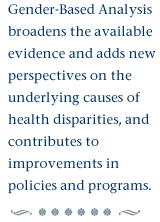 |
|||||||||||||||
|
|||||||||||||||
|
|||||||||||||||
| What is GBA? |

|
||||||||||||||
|
Central to GBA is the understanding that what makes women and men healthy or unhealthy is not just a combination of physical and physiological conditions, but includes many other influences. Health is more than the absence of illness and staying healthy requires more than just receiving good health care. Geography, stress, income, employment conditions, social supports and roles and responsibilities in the community are just some of the factors that affect women's and men's well-being. In the case of health, GBA helps to identify how biological factors, social norms and the structured systems (e.g. legal, political, religious) that govern those norms are all important influences on women's and men's health status, and to clarify the different and similar ways that women and men are vulnerable. GBA illuminates the differences in health status and its determinants, health care utilization in accordance with health needs, ability to pay for health services, and men's and women's participation in health management. Thinking about, and documenting, the roles, responsibilities and power differences between and among women and men in specific contexts, uncovers where there are inequalities and inequities. Ultimately, gender-based analysis broadens the available evidence and adds new perspectives on the underlying causes of health disparities, and contributes to improvements in policies and programs. We offer training in GBA, diversity and health equity. Our expertise can help your organization to more successfully meet the unique challenges you're facing today. |
|||||||||||||||
This website is copyrighted by the
Prairie Women's Health Centre of Excellence, © 1998-2011.
Website design: Pamela Chalmers E-mail: pwhce@uwinnipeg.ca. |
|||||||||||||||
 |
|||||||||||||||


